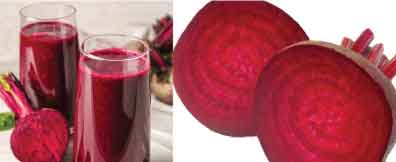
How to Make BEET JUICE in a Blender
Recipe by GennysserYou can enjoy your beet juice at any time of the day. I hope you find it delicious and nutritious for your body!
1
servings5
minutes5
minutesINGREDIENTS YOU WILL NEED:
1 1 small beet
2 2 carrots
1 1 apple
1/2 1/2 lemon (peeled)
1/2 inch 1/2 ginger
1 cup 1 water (filtered or distilled)
INSTRUCTIONS:
- Wash and pat dry all your vegetables with a paper towel. Whenever possible, try to buy organic vegetables.
- Start by cutting the beet, carrot, and apple into small pieces to ensure they blend easily. Peel the lemon and cut it in half, as you will only need half. Finally, cut half an inch of ginger.
- Add all the ingredients to the blender and add the cup of cold water.
- Blend for 1 minute.
- Strain the juice using a cloth strainer or a nut milk bag.
Equipment
- Blender
Beet Juice Benefits
(Beta Vulgaris)

This beet juice is an effective internal cleanser. The intense violet-red color in beets, which seems endless, is due to an interesting component called betalains. Betalains are valued for their powerful detoxification capacity.


Benefits of Beets
6 Amazing Benefits that Beets have in store for you!
1. Protect Your Liver: Beets are one of the most powerful vegetables for protecting your liver. Beets keep your liver healthy, cleansing it, detoxifying and dissolving fats from your liver. If you have fatty liver, beets are a good natural option to detoxify your liver. Reducing oxidative stress in your liver and other parts of the body due to the phytonutrients that beets contain.

2. Anti-cancer properties: Beets are one of the best foods on the list as a natural remedy for cancer prevention. This is due to its powerful substance called Betalains, which slows the growth of cancer cells and tumors in the body.

- Beets contain folate, and this nutrient helps cells grow and function at their optimal capacity.
- The natural nitrates found in beets improve mitochondrial efficiency. Which is responsible for producing energy in your cells. Helping your body produce more oxygen rich in red cells.
- The natural antioxidant contained in beets, protects your cells from radical damage.
3. Help You Lose Weight: Beets are low in calories and high in water and fiber. And these properties are very beneficial for losing weight!
- Beets contain electrolytes to keep us hydrated, and because of the amount of fiber beets have, they also makes us feel fuller for longer periods of time. At the same time giving us energy with its natural sugar content. Improving exercise performance. One cup of beets contains 3.8 grams of fiber!
- Beets are great for balancing your hormones!

4. Improve Your Heart Health: Beets help lower blood pressure and the risk of heart disease. Thus improving blood flow and lowering blood pressure. Fiber, nitrate and potassium all improve your heart health.
- Beets contain a high amount of nitrates that your body can convert into nitric oxide!
Nitric oxide is like a vasodilator that tells your blood vessels to relax. Allowing them to expand and therefore promoting the dilation of your capillaries. Helping your blood flow better throughout your body including your brain. And for this reason it also increases cognitive function, providing a positive function to your mental health. Making beets an excellent food for people suffering from dementia.
5. Keeps Your Digestive System Running Smoothly: The fibers contained in beets are very good for the function of your digestive system and prevents constipation.
- Beets also has many healthy bacteria helping your digestive system fight diseases and at the same time boosting your immune system.
6. High in Nutrients: Beets contain a large amount of nutrients such as Vitamin C, Vitamin B3, Vitamin B5, Folate, Magnesium, Potassium, Nitrate, Betalains, Fiber, Iron, Phosphorus, Zinc, Calcium, Iodine, and beta-carotene.
About Me
And I love making Healthy Drinks Recipes! Here you will find easy and delicious recipes that are just so good for your body and mind!



